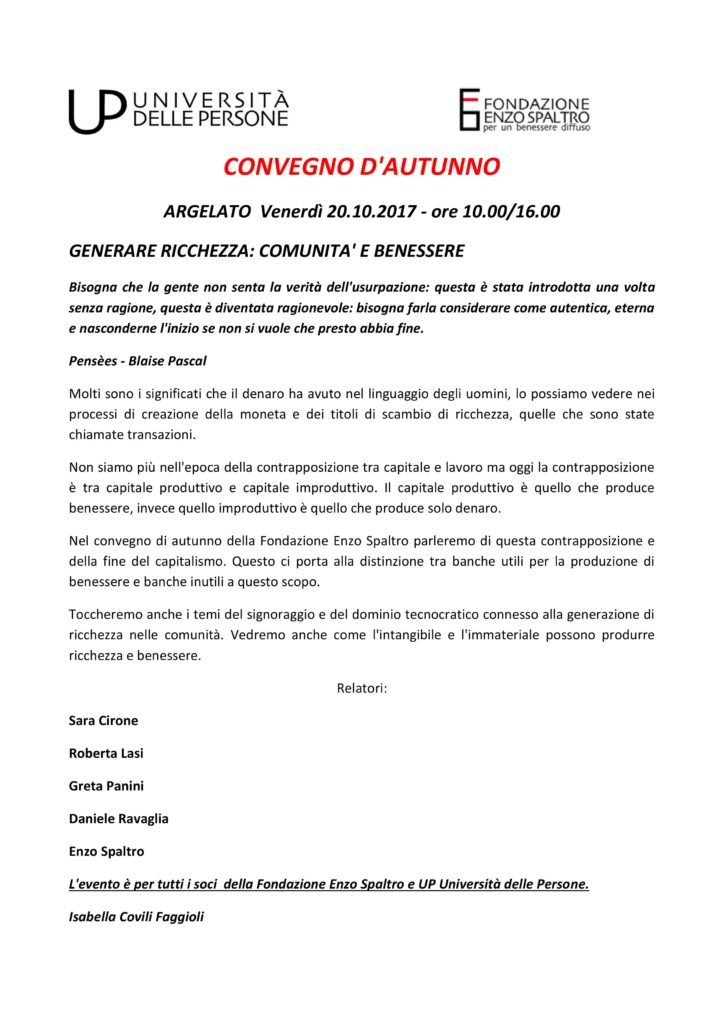Enzo Spaltro spent his life studying the themes of work and industrial relationships in psychology. Without any doubt, he is the most renowned among all the Italian researchers both at national and international level.
Enzo Spaltro’s Foundation has organized the Autumn Conference:
“PRODUCING WEALTH: COMMUNITY AND WELL-BEING” having place in Argelato on Friday 20th October 2017 from 10 am to 16 pm.
Draftsmen: Sara Cirone, Roberta Lasi, Greta Panini, Enzo Spaltro, Isabella Covili Faggioli.
Why Work
As we have already seen, Enzo Spaltro studied psychology and human relations in the specific work field. Man is at the centre of work: man as a human being immersed in social relationships and aiming at his own realization in his most peculiar and precious human characteristics both for his own and civilization’s evolution.
Therefore, work is focused on each human being. In fact, each person is a natural and spiritual creature with intellect, possibility of choice and responsibility.
Therefore, work consists in a field where a person – every person – can achieve a self-realization and give sense to one’s own self-responsibility. This is the reason why Enzo Spaltro’s studies are very close to our perspective: they are both centred on every person’s authenticity and uniqueness.
Capital and Work: an Oppostion from the Past
Which is the usurpation Blaise Pascal mentioned in his Thoughts? That usurpation which – once introduced unreasonably – has been justified subsequently as reasonable, authentic and eternal? This usurpation is money, namely wealth. The produced and transacted wealth. Capital produces that wealth and money. However, nowadays the historical XIXth century’s capital-work oppositions belong to the past. Today, in the capitalistic frame, we consider the new opposition between productive capital and unproductive one.
Productive Capital and Unproductive Capital: the New Oppostition
Once the XIXth century’s opposition has been left and overcome, nowadays we consider the opposition between productive capital (with the capability to produce well-being) and unproductive one (with the capability to produce money). The fundamental assumption consists in the conviction well-being is not synonymous of money, namely wealth. Reaching this shared awareness means the exit from capitalism’ assumptions. It means the end of an economic model with the premisis of a potentially infinite concept of growth. However, today – we know it well – the infinite growth would determine the end of our same existence. Well-being and happiness are not similar or proportional to GDP.
Well-being
The concept of well-being has been replacing the concept of wealth, the one common to all the path of capitalism. Well-being is an impartial and holistic concept considering and including connected multidimensions. Well-being is not linked anymore to growth. In fact, many times we have mentioned natural principles regulating a sustainable economy with the capability to realize well-being: they are the unique and convincing principles producing value and social cohesion. The only ones for securing equilibrium, justice, universal peace, cooperation and respectful realization of socio-economic relations’ systems in a systemic perspective beyond every partial approach.
The Intangible and Immaterial
Who said what exists is the only thing we can see? Science has already admitted this is not true. Also economy is reaching the same conclusions of science by the recognition of the fundamental importance of those immaterial elements called intangibles. Today the process of value creation deriving from managing the intangibles becomes essential in companies’ evolution. This one will be the theme at the centre of the reflections of the conference: this will take the economic conversation back to its fundamental theme, mankind, and not the contrary.
Another essential step in the path of civilization.
RIVOLUZIONE EVOLUZIONE
La transizione a modelli di business sostenibili è solo questione di tempo. Le organizzazioni, le imprese e le pubbliche amministrazioni che scelgono già da ora
